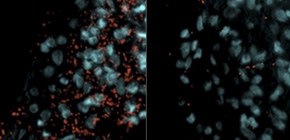
New autoimmune pathogenesis overturning prevailing orthodoxy
Once misfolded proteins bind to MHC, they are not broken down and are transported outside the cell
Under the leadership of ARASE Hisashi (Professor, Research Institute for Microbial Diseases, Immunology Frontier Research Center [iFReC], Osaka University), a group of researchers found that autoantibodies produced in autoimmune diseases recognize abnormal molecular complexes (complexes of misfolded proteins and major histocompatibility complex [MHC]) and that this was related to the development of the autoimmune disease. An autoimmune disease develops when your immune system fails to recognize your normal healthy cells. As a result, your immune system attacks these healthy body cells. However, it is still unknown why autoantibodies are produced in autoimmune diseases.
MHC, a group of genes that code for proteins found on the surfaces of cells, help the immune system recognize foreign substances. MHC is also known as a principal susceptibility locus for many human autoimmune diseases; however, how MHC caused autoimmune diseases remained unknown. Misfolded proteins produced in cells are usually quickly broken down and are not transported through the cell wall. However, this group has clarified that once misfolded proteins bind to MHC, they are not broken down into peptides and are transported by MHC outside the cell where the complex then becomes a target for autoantibodies. It was thought that MHC presented misfolded proteins in the cell to Autologous B cells, which caused autoimmune diseases. Actually, when this group examined blood of rheumatoid arthritis (RA) patients, specific autoantibodies for the misfolded proteins transported by MHC were recognized. Moreover, this group found that persons with MHC likely to bind to misfolded proteins were 10 times more vulnerable to RA than those without MHC. From these results, misfolded proteins transported outside the cell by MHC were found to be involved in the development of autoimmune diseases.
This group has demonstrated a pathogenesis of autoimmune diseases totally different from the accepted one. This is a very important discovery in elucidating the mystery such as why autoantibodies are produced in autoimmune diseases and the relationship of MHC involvement in autoimmune diseases. RA and other autoimmune diseases are thought to develop in the same way. Thus, this group's achievement is expected to contribute to the development of therapeutic agents and diagnostic agents for autoimmune diseases.
Abstract
Specific HLA class II alleles are strongly associated with susceptibility to rheumatoid arthritis (RA); however, how HLA class II regulates susceptibility to RA has remained unclear. Recently, we found a unique function of HLA class II molecules: their ability to aberrantly transport cellular misfolded proteins to the cell surface without processing to peptides. Rheumatoid factor (RF) is an autoantibody that binds to denatured IgG or Fc fragments of IgG and is detected in 70–80% of RA patients but also in patients with other diseases. Here, we report that intact IgG heavy chain (IgGH) is transported to the cell surface by HLA class II via association with the peptide-binding groove and that IgGH/HLA class II complexes are specifically recognized by autoantibodies in RF-positive sera from RA patients. In contrast, autoantibodies in RF-positive sera from non-RA individuals did not bind to IgGH/HLA class II complexes. Of note, a strong correlation between autoantibody binding to IgG complexed with certain HLA-DR alleles and the odds ratio for that allele’s association with RA was observed ( r = 0.81; P = 4.6 × 10−5). Our findings suggest that IgGH complexed with certain HLA class II alleles is a target for autoantibodies in RA, which might explain why these HLA class II alleles confer susceptibility to RA.

Figure 1

Figure 2

Figure 3

Figure 4

Figure 5

Figure 6
To learn more about this research, please read the full research report entitled " Autoantibodies to IgG/HLA class II complexes are associated with rheumatoid arthritis susceptibility " at this page of the Proceedings of the National Academy of Sciences USA website.
Related link :
